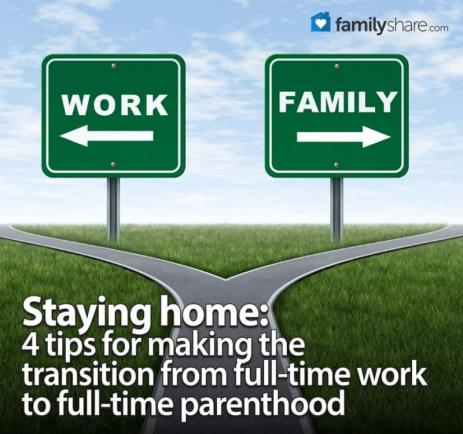
The transition to being a stay-at-home parent can be overwhelming, but a few simple steps can help make the transition smoother.
Transitioning from being a working adult to a stay-at-home parent is not always as smooth as you might think. Virtually everything about your daily life changes - sometimes in ways you might not expect. Recognizing these changes is the first step to accepting them and then managing them.
Change 1: Your daily schedule
As a working adult, your schedule was obvious: you wake-up, shower, go to work, take a lunch break, come home, run errands, amuse yourself for a couple hours then go to bed. On weekends, you take it easy and have fun. As a stay-at-home parent, your schedule is going to be completely erratic - at least at first. Especially in the case of a newborn, but even in older children, sleep schedules and daily demands are in constant flux, making it difficult to get into a routine. This is the change that causes you to look around at four in the afternoon, still in your pajamas, unsure of what day it is or if you've even eaten in the last 24 hours.
Solution: Force yourself into a routine
Even if you aren't willing to force your baby into a routine, toddlers and older children thrive on predictability, and you will, too. Pick a time to wake up, and be diligent about it. Shower regularly, and get dressed (in clothes you would be willing to wear out of the house if necessary) every single day. Prepare meals at reasonable meal times (even if they are microwaved). Yes, there will be days that your routine gets thrown out the window, but at least those days will become the exception, and most days will feel "normal."�
Change 2: Interaction with other adults
In the workforce, you interacted with other adults on a regular basis. Even if your job was solitary, you had phone calls, emails, and meetings, not to mention a quick conversation with the guy running the deli counter where you bought your lunch. As a stay-at-home parent, your daily interaction becomes almost exclusively child-centered. Even conversations with other adults will revolve around (and be interrupted by) your children.
Solution: Get out of the house
Run errands, join a gym, join a mommy-and-me group, go to a friend's house, visit your sister or other family members or your neighbor, get to the park and stay until it gets busy. Sitting in your living room, interacting with adults through your laptop is fine, but it's no substitute for genuine personal interactions.
Change 3: Your daily to-do list
As a working adult, your daily to-do list was often defined by others - customers, bosses, clients or co-workers. As a stay-at-home parent, you and you alone are in charge of deciding what gets done on any given day. Self-motivation is often hard to come by, and everybody has an opinion on what is "really important"� to take care of around the house.
Solution: Prioritize
. Make a list of what is important for you to get done, decide how much of it can be done on any given day, and divvy up the work into daily or weekly lists. Your priorities will shift constantly as your children grow and change so don't be afraid to reevaluate when necessary.
Change 4: Respect for your opinion
This is probably the hardest change to become accustomed to. As a working adult, your opinion is valued. You might even be considered an expert in something. As a stay-at-home parent, your opinion isn't considered at all, unless it's on child-rearing theories. And even then, those are just theories and everyone will jump in line to tell you how you're wrong. Your college degree (or graduate degree), your work experience, or the fact that you've been published in the most well-regarded peer-reviewed journal in your industry are all virtually ignored in the stay-at-home parent world.
Solution: Find something you feel confident in and build up a community around that skillset or knowledge base. This can be something from your Working days, or it could be something new. Find a way to use your skills and knowledge in a way that makes you feel accomplished and worthwhile. Surround yourself with people who support that feeling. Their support and respect for you will make it easier to brush off the naysayers who see you as "just a mom"� or "just a dad."�
The truth is, there's no such thing as being "just a parent,"� even if you are a stay-at-home parent. You are a whole person who lived and had goals and skills and a life before transitioning to being at home. And you still have all those things, you just need to find a way to successfully channel them.

